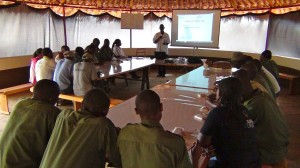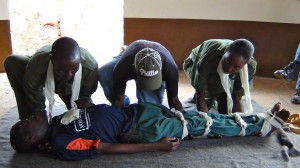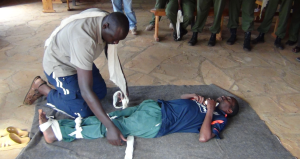Occupational First Aid Training Program at Wildlife Works
- Aug 21, 2012
- 3 min read
Updated: Aug 5, 2024
With the increasing number of employees at Wildlife Works’ Kasigau Corridor REDD+ Project, we decided to host a first aid training program for employees from various departments, with the help of The Kenya Red Cross.
At Wildlife Works, one of our main goals is to protect wild animals and conserve the environment, and during this process, the safety of our employees is a top priority. While patrolling the protected area for poachers, our rangers are faced with various dangers; for instance, poachers who are armed either with guns or bow-and-arrows frequently threaten to attack our rangers, who are usually unarmed. In addition, the wildlife itself poses certain risks, including snakebites. Given these circumstances, first aid training was exceedingly vital.

First aid teacher leading a classroom lesson.
On July 18th 2012, Mr. Sadik Kakai from The Kenya Red Cross, Mombasa, came to preside over the 3-day training program. Mr. Kakai has been with the organization for four years and a first aider for twelve, making him an invaluable resource to lead the training. Twenty-one of our employees turned out for the program, with rangers being the majority, as the subject matter was particularly relevant to their day-to-day operations.
The training kicked off with a brief introduction about the importance of first aid in treating a sick or injured person, especially in situations where a doctor is not readily available. The trainees learned the three objectives of a first aider: to promote recovery, preserve life and prevent further injury.
Different scenerios were discussed at length, including snakebites, bleeding, choking and fainting. The trainees learned about the care and management of these emergencies, as well as how to handle any casualties.

Three of our rangers practice dressing a wounded person.
Constance, one of the female rangers, found the training on snakebites particularly helpful, saying, “Though I am happy with my job, I had a phobia of snakes since I have seen victims lose some of their body parts over the bite. I have never known how to manage such an incident; I would rather stand at a distance and never go near the scene. But after this training, now I can preserve life and this makes me very happy.”

Erick Sagwe, head ranger, during practical examinations.
The training ended with a theory and practical examination to test the trainees’ understanding of the concepts and to determine whether the training was worthwhile.
To close the program, Mr. Eric Sagwa, the head ranger, thanked the lecturer for devoting his time to work with our staff. He reflected on the training, saying, “I am optimistic that during the three days we have been having this training, we have learnt a lot concerning First Aid management and care. I believe that so far we have 21 First Aiders in Kasigau, and these First Aiders are also going to help the community in the event of accidents. Thank you for your time and commitment.”
Here at Kasigau we believe that knowledge is power, and are happy to become role models in the community by harnessing educational programs like these to protect our employees and give them the power to help others as well.
* * * * * * * * *
Wildlife Works is the world’s leading REDD+ (Reducing Emissions from Deforestation and Degradation), project development and management company with an effective approach to applying innovative market based solutions to the conservation of biodiversity. REDD+ was originated by the United Nations (UN) to help stop the destruction of the world’s forests.
Over a 15 year history Wildlife Works established a successful model that uses the emerging marketplace for REDD+ Carbon Offsets to protect threatened forests, wildlife, and communities.
The company helps local landowners in the developing world monetize their forest and biodiversity assets whether they are governments, communities, ownership groups, or private individuals.



